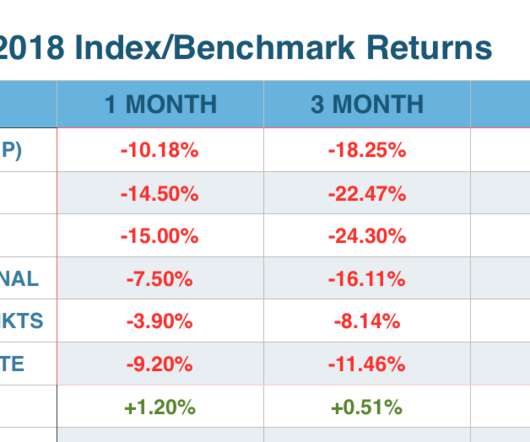Weekend Reading For Financial Planners (March 9-10)
Nerd's Eye View
MARCH 8, 2024
Read More.
This site uses cookies to improve your experience. To help us insure we adhere to various privacy regulations, please select your country/region of residence. If you do not select a country, we will assume you are from the United States. Select your Cookie Settings or view our Privacy Policy and Terms of Use.
Cookies and similar technologies are used on this website for proper function of the website, for tracking performance analytics and for marketing purposes. We and some of our third-party providers may use cookie data for various purposes. Please review the cookie settings below and choose your preference.
Used for the proper function of the website
Used for monitoring website traffic and interactions
Cookies and similar technologies are used on this website for proper function of the website, for tracking performance analytics and for marketing purposes. We and some of our third-party providers may use cookie data for various purposes. Please review the cookie settings below and choose your preference.


Yardley Wealth Management
AUGUST 20, 2024
The post Staying Disciplined: How to Stick to Your Financial Plan Despite Market Volatility appeared first on Yardley Wealth Management, LLC. Staying Disciplined: How to Stick to Your Financial Plan Despite Market Volatility Introduction: Market volatility is a fact of life for investors.
This site is protected by reCAPTCHA and the Google Privacy Policy and Terms of Service apply.

Tobias Financial
NOVEMBER 4, 2024
In financial circles, this will inevitably include discussion of the potential impact on markets. But should elections influence long-term investment decisions? We would caution investors against making changes to a long-term plan in a bid to profit or avoid losses from changes in the political winds.

Darrow Wealth Management
OCTOBER 29, 2024
Rebalancing your 401(k) and investment portfolio is an important part of a successful investment strategy. Your asset allocation is the percentage of your portfolio that you distribute between different asset classes, like stocks and bonds. There are a couple main reasons to rebalance your investment portfolio.

Yardley Wealth Management
SEPTEMBER 10, 2024
This balance can help you withstand different market conditions and increase the likelihood of long-term growth. Invest for the Long Term When investing for retirement, maintaining a long-term perspective is essential. Resist the urge to time the market or chase popular trends.

Nationwide Financial
DECEMBER 7, 2022
The market headwinds have been many this year, with high inflation, rising interest rates, and diminishing liquidity causing concerns among investors. A market downturn at the start of retirement, hitting portfolio values when retirees begin to take account withdrawals, can be unsettling, even for seasoned investors.

WiserAdvisor
APRIL 25, 2023
Rebalancing a 401(k) refers to adjusting the asset allocation of your investment portfolio back to its original target percentages. Your investment strategy determines the target percentages for each asset, often based on your risk tolerance, investment goals, and time horizon. What is 401(k) rebalancing?

Carson Wealth
OCTOBER 26, 2022
As the tax year draws to a close, many high-income investors will look to reposition their portfolios to intentionally generate losses as a way to offset gains — an investment strategy known as tax loss harvesting. I sort of think of tax loss harvesting as the eharmony of investment planning. A net neutral tax position.

Workable Wealth
SEPTEMBER 16, 2020
Welcome back to the second part of our investment lexicon series. By now you have a good understanding of what the market is, how the stock market works, and different methods of tracking market performance. Now it’s time to look at some key tools to keep in mind when investing in the stock market. .

Clever Girl Finance
OCTOBER 8, 2024
Is now a good time to invest? That’s a question many people have, especially with the stock market being so unpredictable. I’m sharing some key investment insights to help you navigate your financial choices and calm any worries you might have about the stock market. Is investing better than saving? Keep reading!

Park Place Financial
MARCH 14, 2022
Investments can be risky since markets constantly fluctuate, but strategies are available to help you maintain a well-balanced portfolio. For example, you can shift money between asset classes to reflect market changes and work with your financial adviser to create a diversified strategy.

Truemind Capital
SEPTEMBER 13, 2021
Sentiments of greed, fear, and confusion are transient in the equity market. For those who are uninitiated, the below chart represents the cycle of greed and fear in any asset class with varying degrees of emotions. In this blog, I am attempting to understand where do we stand in the current market cycle. Do I need to say more?

Dear Mr. Market
JANUARY 25, 2022
Dear Mr. Market: Finally. It’s here… a bonafide stock market correction. Our article that we linked to above followed the least volatile year in the history of the stock market. Anyway, 2018 was never called a “bear market” because we didn’t hit the proverbial -20% by definition.

Trade Brains
DECEMBER 7, 2023
From the above concepts you will learn how to approach financials and plan for your retirement goals with good risk management. Financial Education Certification by NISM National Institute of Securities Market(NISM) is a financial initiative by SEBI that offers courses related to investing. You can enroll in the course here.

Workable Wealth
APRIL 29, 2020
There are many reasons for people to sell assets including Withdrawing money Rebalancing a portfolio Desire to make a change to investment strategy Changing risk tolerance Diversification needs Market performance The bottom line here is that your investments aren’t stagnant.

International College of Financial Planning
JULY 31, 2023
Emotional decisions driven by fear or greed during market volatility can lead to impulsive actions, resulting in missed opportunities or steep losses. Similarly, a lack of diversification can expose investors to unnecessary risk, while chasing hot trends can lead to speculative investments with unpredictable outcomes.

WiserAdvisor
MARCH 30, 2023
A goal-based investing approach is one such strategy. It stands out as it focuses directly on your goals, determining the amount of money you need to achieve your financial goals, and then developing an investment plan designed to achieve those goals within a specific timeframe. 5 steps involved in goal-based investing 1.

Truemind Capital
MAY 19, 2020
It’s not that they knew the time of the market crash, but their investment strategies ensured that their portfolios were prepared for any such eventualities. They understand that stock markets go through a cycle and the valuable lessons from history taught them to read signs and stay cautiously optimistic.

International College of Financial Planning
DECEMBER 29, 2024
The CFP certification stands as the gold standard in financial planning, offering professionals a comprehensive pathway to excellence in this dynamic field. As markets evolve and client needs become more sophisticated, the demand for qualified financial planners continues to grow exponentially.

Brown Advisory
MARCH 30, 2020
Managing Liquidity in the Coronavirus Market ajackson Mon, 03/30/2020 - 16:04 This article was written by Sid Ahl, Taylor Graff, Adam King and J.R. Rodrigo, members of Brown Advisory's Investment Solutions Group. Essentially, liquidity refers to how quickly an investment can be turned into cash.

Brown Advisory
MARCH 30, 2020
Managing Liquidity in the Coronavirus Market. Rodrigo, members of Brown Advisory's Investment Solutions Group. Liquidity, like many concepts in the investment world, is simple on the surface but becomes far more complex when one examines it more deeply. Mon, 03/30/2020 - 16:04.

WiserAdvisor
DECEMBER 15, 2023
These professionals also go beyond the numbers and charts and educate you about investing. They break down complex concepts and equip you with the knowledge needed to invest in financial markets. They can eliminate the fear of loss, overconfidence, or herd mentality so your investment choices are not impacted by poor decisions.

Carson Wealth
DECEMBER 1, 2022
Younger investors have a much longer time frame before they need investment proceeds. Talking with a qualified investment advisor can help you develop an asset allocation appropriate for meeting your financial goals. Determine an Appropriate Risk Tolerance for a Longer Time Horizon . Start an Emergency Fund.

Your Richest Life
SEPTEMBER 10, 2024
Or, if you plan to buy a house within the year and your down payment is sitting in the stock market, you might run the risk of losing that money in a down market before you buy. Make sure that the investments in your account reflect what you are trying to accomplish, both short and long term.

WiserAdvisor
SEPTEMBER 6, 2023
This can help you establish a strong foundation and craft your investment strategy. Checking your retirement account balance early on is essential to confirm that your asset allocation matches your risk tolerance and long-term goals. You can use this time to adjust your asset allocation to prioritize capital preservation.

Brown Advisory
MARCH 28, 2017
We have found that clients who clarify their values and reflect them in their portfolios view that process as a cornerstone of their investment plan, and they tend to successfully stick to that plan for the long term. Past performance is not a guarantee of future performance and you may not get back the amount invested.

Brown Advisory
MARCH 28, 2017
We have found that clients who clarify their values and reflect them in their portfolios view that process as a cornerstone of their investment plan, and they tend to successfully stick to that plan for the long term. Past performance is not a guarantee of future performance and you may not get back the amount invested.

Good Financial Cents
SEPTEMBER 2, 2022
Whether you are hoping to start investing small amounts of money or you have a lump sum of cash to get started, you should know that investing isn’t necessarily a “set it and forget it” activity. Also remember that, like it or not, there is a real risk of losing some of your investment over the short-term.

Brown Advisory
SEPTEMBER 29, 2020
The ACGA payout rates are based on a fairly straightforward set of calculations based on actuarial tables and long-term market return assumptions. The formula takes into account that CGA donors generally enjoy an extended life expectancy relative to the general population, and also assumes a 1% administration and investment management fee.

Brown Advisory
SEPTEMBER 29, 2020
The ACGA payout rates are based on a fairly straightforward set of calculations based on actuarial tables and long-term market return assumptions. The formula takes into account that CGA donors generally enjoy an extended life expectancy relative to the general population, and also assumes a 1% administration and investment management fee.

Sara Grillo
AUGUST 25, 2023
I created this list of financial advisors for small accounts (less than $300,000 in assets) because there are alot of schmucks out there hawking crap products to people with portfolio of this size, and I don’t think it’s fair. I am an irreverent and fun marketing consultant for financial advisors.

WiserAdvisor
DECEMBER 21, 2022
When you do so, you lower risk and increase the chances of earning more, even during times of market volatility. Since no two investments are likely to perform the same at a given time, diversification offers your money a better chance to earn a profit. When you start investing in your 20s, you may find the process overwhelming.

WiserAdvisor
SEPTEMBER 22, 2022
Investing can help you grow your net worth and achieve financial goals that may seem unattainable on a salary. How you use this income to invest in the market decides your overall financial standing to a large extent. Most people are not rich due to their salaries but because of their investment returns.

WiserAdvisor
DECEMBER 11, 2022
In fact, significant layoffs have already begun across the market. If your asset allocation has changed from the original ratio, you can consider rebalancing it to suit your present financial goals and objectives. Make sure your investment portfolio is well-diversified.

WiserAdvisor
FEBRUARY 12, 2024
Asset allocation is the primary building block of any investment strategy. It is the process of spreading investments across various asset classes to optimize the balance between risk and potential returns. As discussed above, it varies according to individual investment goals, time horizons, and risk tolerance.

The Big Picture
AUGUST 20, 2024
Why don’t we just have a conversation in the studio about his beef with passive, why he thinks it’s a structural threat to the market? Now, I don’t believe the market structure is subject to the same risks as a single inverse trading instrument, but he makes a really compelling case for this is important.

Trade Brains
JANUARY 20, 2024
Sometimes we might feel overwhelmed by the choices available in the market and most of us become indifferent to these options. Client Base : 7 million + Market share : 18.33% Charges Account opening charges: Rs. Client Base : 6 million + Market share : 14.24% Charges Account opening charges: Rs.249 200 Equity + Rs.100

The Irrelevant Investor
MAY 23, 2019
Each of these decisions are critical and at least as important as your asset allocation. Then we spoke about how much cash do I want available, given that Robyn is taking a year off when we have our second child, and given that my income is already levered to the stock market. What I mean is that you need an investment plan.

WiserAdvisor
NOVEMBER 21, 2022
Unlike the average investor or other financial professionals, a CFP is a licensed expert in areas like estate planning, taxes, retirement, insurance, and investment planning. Retirement planning, estate planning, tax planning. Developing a diversified investment portfolio.

The Irrelevant Investor
OCTOBER 20, 2015
Fisher, 1958 The Money Game - George Goodman, 1967 A Random Walk Down Wall Street - Burton Malkiel, 1973 Manias, Panics, and Crashes: A History of Financial Crises - Charles Kindleberger, 1978 The Alchemy of Finance - George Soros, 1987 Market Wizards - Jack Schwager, 1989 Liar's Poker - Michael Lewis, 1989 101 Years on Wall Street, An Investor's Almanac (..)

The Better Letter
APRIL 20, 2023
Asset allocation is more important than the selection of a portfolio’s component parts. ” Be clear about what Barry Ritholtz calls the “long cycle” – secular and cyclical markets. All other things being equal, ETFs are better than mutual funds. Simple generally beats complex.
Expert insights. Personalized for you.
We have resent the email to
Are you sure you want to cancel your subscriptions?


Let's personalize your content